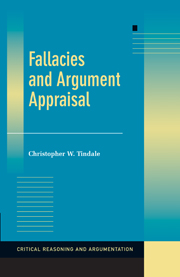Book contents
5 - AD HOMINEM ARGUMENTS
Published online by Cambridge University Press: 05 June 2012
Summary
Introduction
In the wide public domain, where controversial issues are debated and personalities invariably clash, the strategy of attacking an opponent because of some real or perceived characteristic, circumstance, or association is particularly prevalent. The strategy of attacking the person falls under the general umbrella of ethotic arguments, that is, arguments that deal with some feature of the character of the speaker. Where the attack is problematic in particular ways, we charge the attacker with committing the fallacy called argumentum ad hominem (argument against the person). We have to be clear that we are speaking here of the fallacy involved in this strategy. While the textbook tradition for a long time treated all such arguments as fallacious, more recent treatments have appreciated that it is often quite appropriate to draw attention to some feature of a person's character or circumstances when it has a direct bearing on what that person says. Part of the previous confusion was due to the extreme looseness of many textbook treatments of this fallacy. There is also the further complication that the way the ad hominem has been understood and treated over time has changed. We need to consider some of this history and then fix on what modern treatments identify as problematic.
The first philosopher to draw attention to the ad hominem is John Locke (1632–1704), although he does not claim to have invented the term, and Hamblin attributes the idea, if not the title, to Aristotle.
Information
- Type
- Chapter
- Information
- Fallacies and Argument Appraisal , pp. 81 - 103Publisher: Cambridge University PressPrint publication year: 2007
